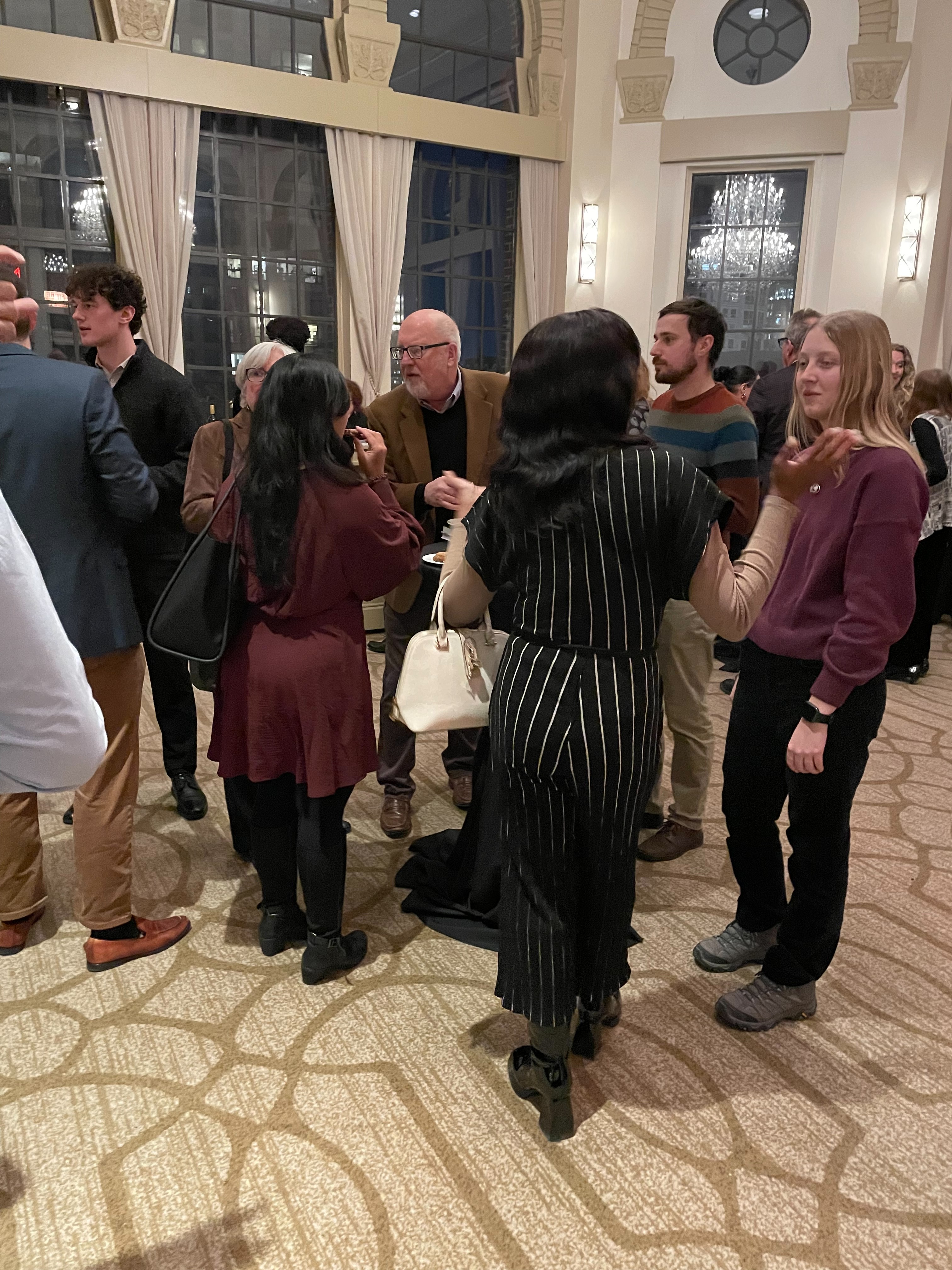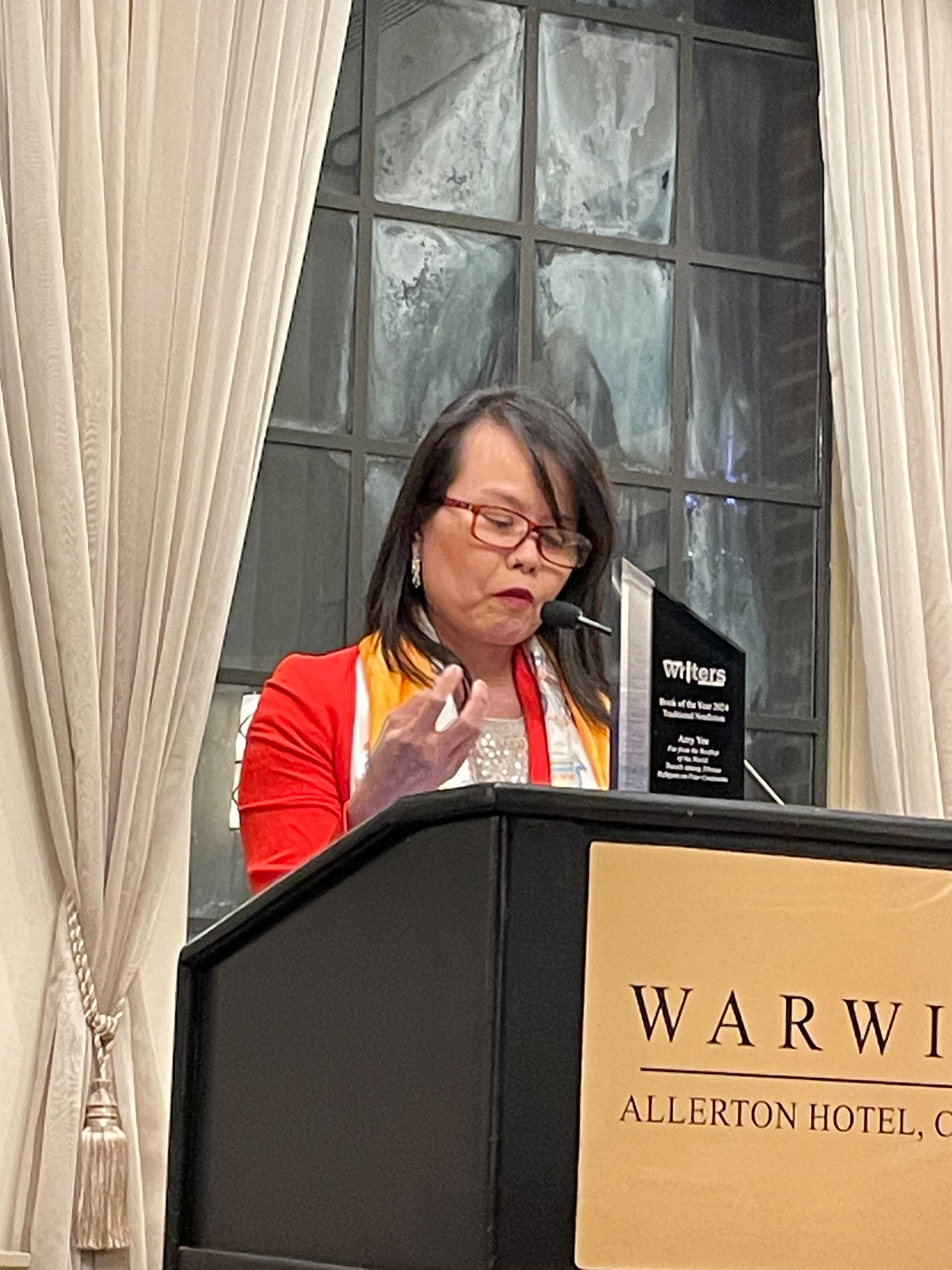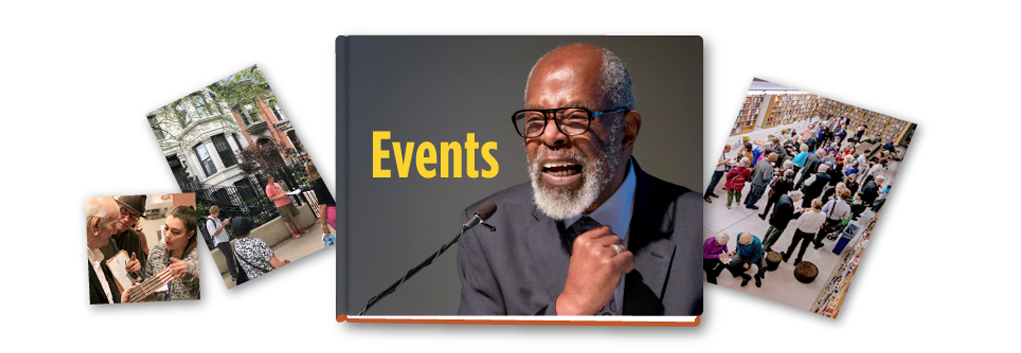Chicago Writers Association Honors 2024 Book of the Year award winners at Warwick Allerton Hotel
Wednesday, January 22, 2025
by Michael Antman
The Chicago Writers Association (CWA) Book of the Year awards ceremony, held on January 18 at the Warwick Allerton Hotel’s Tip Top Tap Ballroom, honored a highly eclectic group of books, ranging widely in subject matter and setting from a remote farm in rural Illinois to the “rooftop of the world,” the Tibetan Plateau in Central Asia.
The awards, presented annually since 2011, provide a heartening glimpse into the continued vigor of the Chicago literary scene through recessions, pandemics, technological change and political upheaval. The awards are of particular value to the city’s writers because — unlike New York-centric organizations such as the National Book Awards and the National Book Critics Circle — the CWA gives equal weight in its prize-giving to traditionally published and self-published (in the CWA’s terminology, “indie”) books. That means that voices and perspectives that might be considered too “regional,” too specialized, or not sufficiently aligned with the intellectual fashions of the day will still have a chance to be heard.
pandemics, technological change and political upheaval. The awards are of particular value to the city’s writers because — unlike New York-centric organizations such as the National Book Awards and the National Book Critics Circle — the CWA gives equal weight in its prize-giving to traditionally published and self-published (in the CWA’s terminology, “indie”) books. That means that voices and perspectives that might be considered too “regional,” too specialized, or not sufficiently aligned with the intellectual fashions of the day will still have a chance to be heard.
It was particularly encouraging to note that the winner of the Indie Non-Fiction Book of the Year award, Mark Taylor’s Hospital, Heal Thyself: One Brilliant Mathematician’s Proven Plan for Saving Hospitals, Many Lives, and Billions of Dollars concerns itself not with politics or polemics but rather (as the title makes clear) with practical and evidence-based solutions to American healthcare’s woeful state of affairs.
Taylor’s book details the theories and real-world experiences of Eugene Litvak, Ph.D., the president and CEO of the non-profit Institute for Healthcare Optimization (IHO) and Adjunct Professor of Operations Management at the Harvard T. H. Chan School of Public Health. Litvak’s methodologies, implemented at a number of hospitals during the Covid pandemic, aim to reduce hospital overcrowding, eliminate healthcare inequities and improve the response to emergency situations such as pandemics and natural disasters.
Fictions, by Ashley Honeysett, won the CWA’s Traditional Fiction Book of the Year, as well as the 2023 Miami University Novella Prize. It’s diaristic in form, modest in tone, and concerned with the anxieties and dilemmas of the writing life. One reviewer noted, “Fictions is a love letter to the curious and often deeply absurd nature of the writer’s life. Honeysett is a marvelous narrator of family, parental, and intergenerational stories, all the time wrestling with the question of how exactly stories get made.”
The Indie Fiction Book of the Year prize was awarded to Christopher Hawkins for his horror novel Downpour, about a farm family trapped in their home by a toxic rain. It’s described by one Reddit poster as a “huge bummer,” and to be clear, that’s very much meant as a compliment (it’s recommended in a thread for readers in search of “bleak books with no happy ending.”) For fans of dark, speculative fiction in the style of Stephen King, Joe Hill or Paul Tremblay, Downpour looks to be an intriguing addition to the genre.
Among the causes that have been most notably left in the dust by the intellectual fashions of the day is that of Tibetan independence, eclipsed almost entirely in the public consciousness by other, and perhaps not quite as worthy, quests for independence. In her Traditional Non-Fiction Book of the Year, Far From the Rooftop of the World: Travels Among Tibetan Refugees on Four Continents, journalist Amy Yee recounts her experience traveling across India and around the world to meet with the widely scattered Tibetan diaspora. Yee’s journey begins with a chance meeting with the Dalai Lama in his home of exile in Dharamshala, India, where he has lived since his forced exile in 1959.

Yee, a former Financial Times staff reporter in New York, and Delhi correspondent in India, undertakes her journey to meet activists and ordinary Tibetans who have been facing cultural, religious and political persecution at the hands of the Chinese government for decades.
Something of the flavor of Yee’s vivid prose can be seen in this excerpt, describing a dusty and forgotten store in Dharamshala that seems to symbolize the faded hopes of the Tibetans themselves:
“Kurush [the store’s owner] looked wistful as he said, ‘People would tell my father, everything has changed in the world except this place.’ Indeed, little had changed at the store in the last fifty years, and the place was more of a down-at-the-heels museum. Painted wooden signs on the wall declared, ‘Take Andrews Liver Salt and Keep Fit’ and ‘Palmolive Keeps Skin Clear.’ There were ads for White Horse Scotch, Bluebird Toffee, Cavanders Navy Cut Cigarettes, and Spring's Chocolates. One advertised leather shoelaces.
“That autumn day when I chatted with Kurush, no other customers came inside to peruse long aisles of glass-topped wooden display cases or examine the candy jars arranged on a tall three-tiered table. A look at the goods told you why. Nothing seemed to have been disturbed for decades; perhaps not even the last big earthquake in 1986 had wrinkled the thick blankets of dust.
“A wooden box with a glass cover displayed different types of cookies cloistered in small, labeled compartments. The gingerbread and Boston cream were so ancient they had disintegrated into heaps of powder against the glass, like corpses in a cell. These cookies were once precious goods, carried by ship across oceans from England to India, hauled from a port, and put on a train that chugged to the northern hills. The words painted on the box spoke of a congenial, bygone era: ‘When the samples in this case become faded, kindly return them to Reading. We shall be pleased to replace them with a fresh set upon request.’ In another case, boxes of metal pen nibs rested next to dusty bottles of ink. Stacks of ‘mourning stationery’ bundled in black satin ribbon sat nearby. In another era, someone dipped pen nibs in ink to write a condolence letter on creamy stationery edged with black piping.”
write a condolence letter on creamy stationery edged with black piping.”
Honorable Mention for Traditional Fiction was awarded to The Best That You Can Do: Stories by Amina Gautier, and, for Indie Fiction, to To Do Justice by Frank S. Joseph.
For Traditional Non-Fiction, Honorable Mention was awarded to Writer’s Postcards by Dipika Mukherjee, and for Indie Non-Fiction, Honorable Mention was awarded to Victoria Ann Granacki’s An Artist Goes to War: Leon Granacki in the South Pacific.
The evening featured readings by all four of the winners, a buffet dinner and a cocktail party where, at one end of the room, guests and honorees could gaze out at one of the city’s most famous signs, the glowing red letters spelling out “Tip Top Tap.”
Michael Antman is the author of the novels Cherry Whip and Everything Solid Has a Shadow. He is a longtime book and theatre critic and was a two-time finalist for the National Book Critics Circle’s Nona Balakian Award for Excellence in Reviewing.








